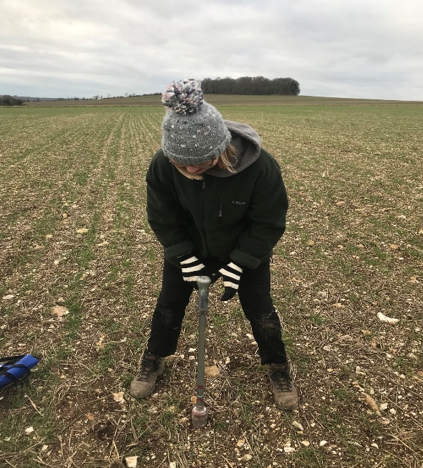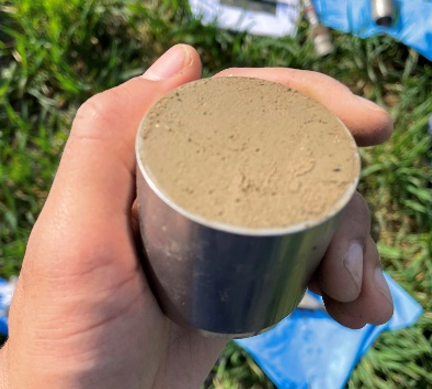This February and March the Farmland Ecology Unit collected 1,200 soil samples as part of the healthy soil, healthy food, and healthy people (H3) project. H3 is part of a large interdisciplinary project aiming to transform UK food systems by putting the health of people and the environment at the forefront of UK food production. Here is a short introduction video about the H3 project:
We are involved in part of the project that looks at how regenerative agriculture specifically can contribute to the overall aims, directed by Dr Lynn Dicks at the University of Cambridge. Regenerative agriculture is a loosely defined concept, but it hinges on the idea that food production can actively benefit the environment.
H3 is investigating how regenerative agriculture techniques can improve soil health by reducing soil disturbance compared to conventional methods. For example, by using direct drilling to plant crops instead of ploughing. In theory, reducing soil disturbance should improve soil biology, soil structure, farmland biodiversity, and soil carbon stores. Better quality soil could increase farmland resilience to climate change and reduce the artificial inputs needed for UK agriculture.
We collected soil from three types of farms - farms using conventional farming practices, regenerative practices, and farms transitioning away from conventional practices to regenerative ones. The soil samples will be sent to the University of Sheffield to conduct tests to compare the effect of regenerative agriculture on soil health to conventional practices.
They will be measuring a number of indicators for soil health such as carbon storage, organic matter present, soil density, pH and structurally stability. Ella, a PhD student from Sheffield, joined us to collect earthworms and environmental DNA (eDNA) from the soil. Hand sorting the earthworms allows a comparison of earthworm diversity and abundance between the different practices.
This can be directly related to soil health due to the key role earthworms play in soil health maintenance, so more worms equals better soil. The collection of eDNA allows the accurate monitoring of changes to the earthworm communities in response to conventional farming and regenerative farming and the transition between the two practices.
To collect the samples needed we have been lugging soil corers, metal rings, mallets and spades across twenty-five fields across the Allenford farmer cluster and the West Cambridgeshire Hundreds farmer cluster. We took 6 samples from 8 points in each field. At each point the soil corer was fitted with metal rings and twisted into the ground to collect three surface samples. We then collected three progressively deeper samples.
 Ruby, FEU placement student, using the corer
Ruby, FEU placement student, using the corer
This is when problems would arise. Fields on the Allenford cluster were a minefield of stones with shards of flint and chalk littering the ground and larger chunks buried beneath the surface. Too often we heard the dreaded sound of metal on stone. If it was flint, we had to abandon the sample as soil would not be taken up by the ring. If it was chalk, we could use the mallet to drive the corer through it in hope we could fill a ring enough. This occasionally led to rings completely full of chalk.
 The last soil sample
The last soil sample
The soil in Cambridge was a lot easier to work with as the fields were free of rocks but the sticky, clay-like texture of the soil gave us different challenges. The stickiness of the soil made it hard to twist the corer downwards, so we had to use the mallet to force it in. Then we had to pull upwards against the suction of the damp soil. The first few samples in a day were easy but by the end we started to feel the strain of our repetitive actions. Luckily, the glorious weather we had in Cambridge eased our pains. As well as the satisfaction from moulding the soil into the last ring.